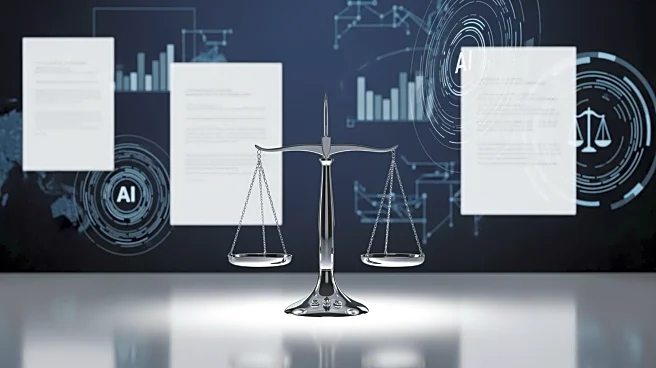What's Happening?
Law practices are experiencing significant disruptions due to the rise of artificial intelligence and changing market dynamics. Many firms are vulnerable to these shifts, as automation and consolidation
alter client expectations. During the COVID-19 pandemic, numerous brick-and-mortar firms faced closures as clients stopped visiting and courts temporarily shut down. Additionally, environmental groups have begun offering free legal services, impacting niche practices that once thrived. Lawyers are advised to leverage their existing expertise, systems, and relationships to bridge cashflow gaps and explore new business models. The focus is on finding unmet demand and experimenting with innovative solutions to adapt to the evolving legal landscape.
Why It's Important?
The disruption in law practices highlights the broader impact of technological advancements and market changes on traditional industries. As AI becomes more prevalent, legal professionals must adapt to remain competitive. This shift affects not only individual lawyers but also the legal industry as a whole, prompting a reevaluation of business models and service offerings. The ability to reinvent and diversify income streams is crucial for survival. Lawyers who successfully navigate these changes can redefine their practices and potentially lead in emerging areas such as AI ethics and digital estate planning. The situation underscores the importance of innovation and adaptability in maintaining relevance in a rapidly changing environment.
What's Next?
Lawyers facing displacement by AI are encouraged to explore new business models, such as flat fees or subscriptions, and consider shifting to different practice areas. The focus should be on experimentation and identifying pain points that can be addressed through innovative solutions. Successful reinvention may involve becoming a leader in AI ethics or offering fractional general counsel services. The legal industry is poised for transformation, with opportunities for those who can anticipate and respond to emerging trends. As markets evolve, the next practice area will likely emerge from current challenges and the curiosity to solve new problems.
Beyond the Headlines
The ethical implications of AI in legal practices are significant, as automation may affect the quality and accessibility of legal services. Lawyers must consider the balance between efficiency and maintaining human oversight in legal processes. Additionally, the shift towards free legal services by environmental groups raises questions about the sustainability of traditional fee-based models. The long-term impact of these changes may lead to a more democratized legal landscape, where access to justice is improved but challenges in maintaining profitability persist. The cultural shift towards embracing technology in law practices could redefine the profession's future.











